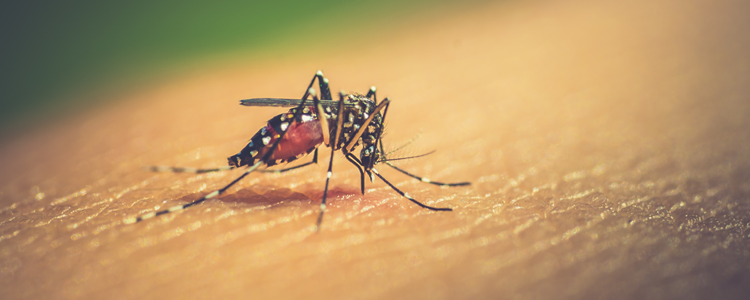Dengue – Causes, Symptoms, Treatment and Precautions

Dengue fever is an infectious tropical disease caused by the dengue virus. With rapid urbanization and global travel leading to drastic demographic changes, dengue fever has become a threat to almost 40% of the world’s population i.e. over 2.5 billion people.
Dengue in India has dramatically expanded over the last few decades. It is estimated that India has the largest number of dengue fever cases, with about 33 million direct and another 100 million indirect infections occurring annually.
What are the causes of dengue Fever and its transmission?
Dengue fever is caused by a virus Dengue (DEN) virus, a member of the genus Flavivirus (family Flaviviridae). It is classified into four serotypes namely, DEN-1, DEN-2, DEN-3 and DEN-4. The virus is carried by a species of mosquito called Aedes aegypti. The mosquito typically bites during the day, particularly in the early morning or in the evening. Dengue can also be transmitted via infected blood products and through organ donation. Other person-to-person modes of transmission have also been reported but are very unusual.
What are the symptoms of dengue fever?
Dengue fever causes flu-like symptoms and is characterized by high fever (above 40°C) and at least two of the following symptoms:
- Severe headache
- Pain behind the eyes
- Muscle and joint pain
- Nausea
- Vomiting
- Rash
Symptoms of dengue fever begin about 4 to 6 days after the infection and usually last for 10 days. Dengue is also characterized by leukopenia (a decrease in the number of white blood cells in the blood).
- Once dengue is contracted by a person, it undergoes three main phases namely: Febrile phase, Critical phase, and Recovery phase. During the febrile phase, the patient experiences an onset of high-grade fever, facial flushing, skin redness, generalized body ache, muscle and joint pain, headache, sore throat, anorexia, nausea, and vomiting. In the critical phase, a significant plasma leakage is lost for 24-48 hours.
- Before the plasma leakage, the patient experiences progressive leukopenia (loss of WBCs). This prolonged shock to organs leads to hypoperfusion (decreased blood flow) which in turn causes organ impairment which can turn fatal to the patient.
- In the recovery phase, general well-being improves, appetite returns, gastrointestinal symptoms abate, hemodynamic status stabilizes and diuresis (increased urine production) ensues. WBCs start to rise followed by a recovery of platelet count.
What are the treatment options for dengue?
- During the febrile phase, treatment is provided to reduce fever. Other NSAIDs (Nonsteroidal anti-inflammatory drugs) are avoided. In case of excessive vomiting or diarrhea resulting in dehydration, or early bleeding, one should be hospitalized for close observation.
- During the critical phase, a key management strategy is judicious fluid administration. Platelet transfusions are usually given to patients who have very low platelet counts. Transfused platelets survive only for a very short period in patients with shock syndrome.
- Intravenous immunoglobulins have been used in the treatment of dengue with little success. There is currently insufficient evidence to make any recommendation regarding the use of intravenous immunoglobulins in dengue shock.
What are the precautions to avoid dengue?
Aedes aegypti prefers to lay its eggs in artificial water containers, to live near humans, and to feed on people rather than other vertebrates. Common breeding sites for them are:
1. Outdoor:
- Flower Pots
- Flower pot plates
- Hardened soil of potted plants
- Roadside drains
- Roof gutters
- Tree holes
- Plant axis
2. Indoor:
- A collar of the toilet bowl
- Air Conditioner trays
It is vital to prevent the breeding of mosquitoes by taking care that there is no stagnant water inside or outside your house. Keep the above areas clean.
The best prevention for dengue is to avoid being bitten by mosquitoes. Other preventive measures include:
- Wearing long-sleeved clothing and full-length trousers
- Installation of mosquito nets
- Using mosquito-repellent creams
- Avoid visiting places that have the presence of mosquitoes
- Covering water containers tightly so that mosquitoes cannot lay eggs
- Disposal of domestic wastes properly to prevent the accumulation of stagnant water.
- Changing water in vases and aquatic plants at least once a week, leaving no water under the pots or in the bottom saucers.
About Dr L. Venkatesh:
Dr L. Venkatesh is the Director and Chief Consultant Physician in Visakhapatnam, at Omni Hospitals. With 10 years of rich experience, he is adept at handling critical cases of cerebral malaria, dengue, scrub typhus, and leptospirosis. He is an expert in handling cases of diabetes, hypertension, and thyroid Disorder.
About Omni Hospitals, Visakhapatnam:
Omni Hospitals, Visakhapatnam is a reputed hospital in Vizag. With skilled doctors and sophisticated equipment, Omni Hospitals strives hard to conquer new heights every day. Compassion beyond cure is our motto and we aim to deliver the best treatment to each of our patients.
